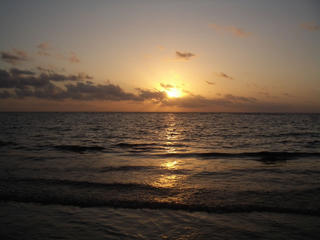Atauro Island and Human Rights training in Ainaro
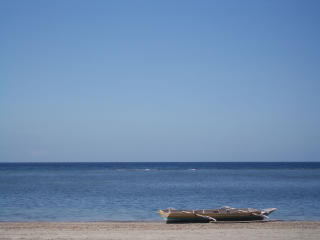 There is definitely something about the sky and the sea that is very conducive to relaxation...
There is definitely something about the sky and the sea that is very conducive to relaxation...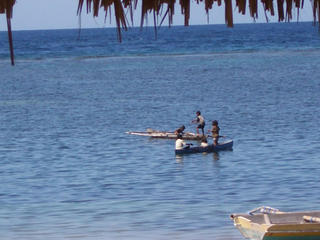 and play...
and play... Instead of scheduling an extra trip for the regular passengers, they left them without any transport! It was appalling. Being “malae” we were informed by the Australian woman who runs the eco village on the island the night before that we would need to catch a speedboat instead, which she arranged for us. So instead of paying $7.50 each and taking 2.5 hours to reach the island, we paid $30 each and reached the island in just over an hour. We were not anticipating this increase in travel expenses so our weekend turned out more expensive than we had planned for. However, we quickly got over that and enjoyed a relaxing and peaceful two days in our beautifully constructed bamboo hut (below), which had views across the ocean.
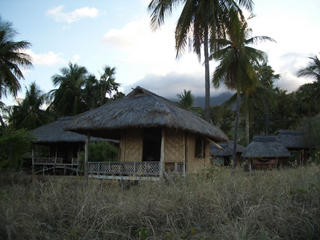
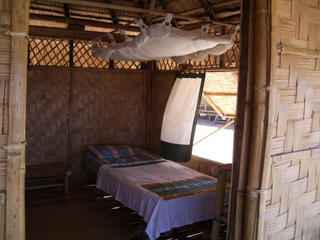
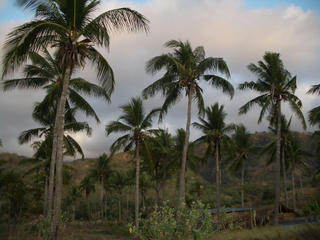
Everywhere in Timor you will find coconuts and palm trees. Atauro was no exception.
I finished reading Beating the Biological Clock: The Joys and Challenges of Late Motherhood by Pamela Armstrong, which I borrowed from the library at my work. The author is English and it was published in 1996 so it’s a bit out of date. However considering Timorese women have more children (and probably start earlier) than women anywhere in the world - I struggled to see the local relevence.
Moreover, it wasn’t a very well written book and I certainly wouldn’t recommend it to anyone. That said, it helped me with a few issues I am having to come to terms with regarding my plans to become an older mother. It was the catalyst for further discussions with Daniel as to what we would do if the foetus were severely disabled as given my age, the chances are great. We also wondered how many eggs I had left and when I would reach menopause. Australian researchers in Adelaide are working to devise a test, which they hope to have on the market in the future, which will predict how many fertile years a woman has left. It will be life changing to have such a test available.
The Australian woman who runs the eco resort we stayed at has lived in Timor for ten years, and for the three years prior in Indonesia. In the early 1970s she lived in Papua New Guinea. She is intelligent, fierce and charming. She had just become a grandmother and wore her long gray hair in a bun. She was just the most amazing woman and I think I partly fell in love with her! Daniel was a little concerned but I reassured him that I wasn’t going to run off with her.
The eco resort is a low impact construction with about ten huts, a communal dining room, composting toilets (the best I’ve ever used) and a “mandi” with warm water from the mountain springs. The food was really good (Timorese/Indonesian style) and for breakfast, we had the best (white) bread rolls we have tasted so far in Timor which we ate with wild honey. We mostly lay in our beds reading while watching the ocean and went for a couple of small swims close to shore in the early evening. On our last morning, we went for a longish walk along the beach. It was just sublime and there was hardly any noise. We highly recommend this place and plan on returning again soon. The cost was $25 a night each including three meals and $30 each for Saturday night.
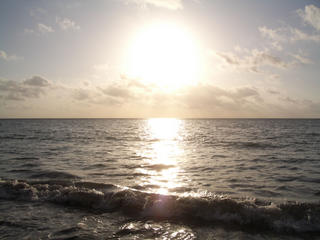 The sun rises over the waves...
The sun rises over the waves... We returned by the same speed boat late Monday morning and ate at a little “malae” café which is owned by the Aussie bloke who owns the speed boat we travelled to/from the island in. An Aussie woman working there makes lentil rissoles and scones. We chose to have the veggie lasagne instead (which wasn’t very nice as it was store bought) but we had a scone each with jam and cream (from a can) which was yummy. We decided next time to have the lentil rissoles as the home made food appears to be immeasurably better than the store bought (and inevitably imported from Australia).
On Tuesday morning I went with Daniel to his work in preparation to leave for Ainaro at midday. It turned out that we weren’t leaving until after lunch so we went and enjoyed a Timorese/Indonesian meal. While waiting to leave, I read a booklet recently produced by the United Nations Office in East Timor, which summarised some of the many achievements of the UN during the past three years. It was the first thing I had read which was positive about Timor. It was actually a relief to read something that didn’t focus on the brutal history and the many problems that afflict the country. I also read about projects that will help me in my work and duly took down notes.
In the end, we didn’t leave until 4pm and I was not happy but I couldn’t do anything about it. I sat in the front passenger seat as I often get carsick and was the only person in the car to wear a seatbelt!
Again, these issues really get to me as I was in the car with mainly university educated people who saw no need to secure their safety when driving on very bad roads. I had to endure the constant chatter in Tetun of the three people in the back seat (including Daniel) while we listened to very loud 1980s music. It was a strange feeling being driven up incredibly windy roads into the mountains of one of the world’s poorest countries while listening to the music of my youth. The effect was to evoke many memories of my not so happy early teenage years.
After a food stop for the three Timorese men in Aileu, we finally arrived in Ainaro just after 9pm. The 110km trip had taken us just over 4 hours as we managed to drive mostly around 20-30km an hour rising every now and again to 45km an hour due to the windy narrow roads which often turned into large pot holes. A couple of times I screamed and flinched as we narrowly missed oncoming traffic or pedestrians.
We were welcomed at our guesthouse by a middle aged Timorese woman and her three grandchildren who were staying with her for the summer holidays. There was much Australian memorabilia all over her house as members of her family live in Sydney and many Aussie peacekeepers had stayed there during 1999.
We ate dinner (white rice, stir-fried green leafy vegetables and eggplant) and promptly went to bed. The mattress on our bed was dreadful so we managed to find a spare one to put on top of the other, which did increase the comfortableness of it slightly. The early morning was very cool and I woke up cold, which was a nice change from sweltering Dili. I declined to have a wash as it was cold water in the “mandi” and I really couldn’t bear the thought. There was a squat toilet next to the “mandi” but there was hardly any room to get around it so I had to back myself onto the toilet and then squat. Water was all over the floor, which made it all the trickier as I worried about slipping. The bathroom was simply awful and I tried not to have to spend too much time in there. Unfortunately I was due for my period so knew I would have to grow to like it!
We walked the short distance to the public building where the human rights training was to be held. The town is surrounded by mountains and clouds, which are pretty, and the air was cool. The key to the door could not be located so our Timorese driver broke the door so we could gain access. Daniel commented that we wouldn’t have done that in Australia and the meeting would simply not have gone ahead!
The human rights training began at 9:30am. Of fifty invitations issued throughout the district the week before, thirty-two people attended including the local police, the xefi sucos (village chiefs), a women’s group, and young people’s group. On the second day, thirty-eight people attended including two nuns. Three of Daniel’s Timorese colleagues conducted the training over the two days, each focusing on a different area of expertise. The first talked about human rights in general, the second about the legal system in Timor, and the third about women’s and children’s rights along with domestic violence issues.
We couldn’t understand most of what they said (Daniel got a lot more of it than me and one of the trainers assisted with translating bits and pieces also), but it was very good to observe how the training was conducted and the interaction with the participants. Over the course of the two days we had a number of instances of feeling overwhelmed by the level of participation of people in particular, how the police and citizens worked together in small groups. We felt this way of conducting training built bridges between those in authority (the police and xefi sucos) and the general population.
It was also very emotional to see the Timorese police officers in their smart blue uniforms and their berets on their heads. It has only been the last couple of years that the Timorese have been able to govern themselves and have their own police and army. It is such a wonderful project that Daniel’s NGO is conducting and my organisation also conducts similar work which we hope to jointly do together in the future.
We discovered that the guesthouse we were staying in was torched by the militia in 1999 and had been rebuilt by the peacekeepers. Evidence of the destruction was still visible, as the roof remained blackened from the fire. Our host’s brother was murdered by the militia (Ainaro was a hotbed for militia activity). Our host’s husband worked for the UN after the peacekeepers arrived and now he is a driver for local bigwigs and people like Jose Ramos Horta when they visit the area.
Before we departed early Thursday evening, I decided to take a photo of the mother duck and her 10 little baby ducklings. I was besotted with them since I heard their little chirps the night we arrived. I knelt down to take a photo and I noticed two little girls behind me watching. As my Tetun is not up to the level of asking if they would like me to take their photo, I motioned to them and said “hamutuk” (together). I took a photo and then showed them the result on the screen. They laughed. More little girls joined in and wanted their photo taken too. So this went on and on as I attracted many more little girls and then showed them the result. They all laughed very excitedly. I then went over to their mothers and showed them the result and asked if they wanted their photo taken. All the little girls joined their mothers so I ended up with a series of photos where the number of little girls and their mothers in them increases. We promised that when we returned we would bring copies of the photos with us. We have included one of them below, also with ´Tia´ (´aunt´ - woman far left) - our wonderfully attentive host!
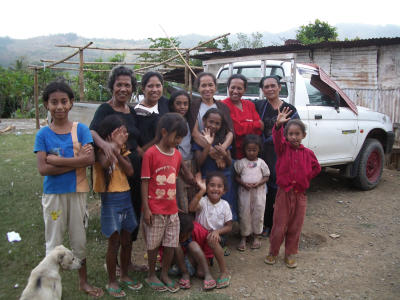 The journey home resulted in both Daniel and I feeling sick. We didn’t leave until around 5:30pm and again we stopped in Aileu so the Timorese men could eat.
The journey home resulted in both Daniel and I feeling sick. We didn’t leave until around 5:30pm and again we stopped in Aileu so the Timorese men could eat.During the trip, my phone started ringing and I fumbled through my things to answer it before the person hung up. It was my Great Auntie Pat ringing to wish me a happy birthday. I was thrilled. When I hung up a text message came through from my sister also wishing me a happy birthday. I had had an unusual 35th birthday in that I had spent all day listening about women’s and children’s rights and domestic violence in a language I mostly did not understand in a small town of about 4,000 people in the middle of one of the world’s poorest countries. It was certainly memorable.
Thirteen kilometres out of Dili, our driver pointed out Xanana and Kirsty’s house. We had passed it on the way up and I had wondered then if that was the President and First Lady’s house. It was up on a hill so I couldn’t really see the house properly but there was a large garden all the way down the hill to the road. The house was certainly more modest than the one built specially for the President further on down the road (the official residence), which I mentioned in a previous post.
Around 9km from Dili the traffic came to a halt as we saw police lights flashing up ahead. We pulled over to the side of the road and one of Daniel’s Timorese colleagues got out and went to investigate. He came back a short time later to say that a truck was stuck on the bend and was blocking most of the road.
The police couldn’t get it out and they said we would have to sleep in our car for the night and wait until morning. By now it was just after 10pm and I was tired and very angry. There was no way that all six of us would be able to sleep in the car comfortably. I got out of the car and decided to go and investigate myself. I couldn’t believe it; a massive lorry with an incredibly heavy piece of road building equipment had got stuck on the bend and couldn’t move. A rope was tied to it and the other end was tied around a small palm tree. As if the tree could hold that!
There was a crowd of men milling about looking at the problem and I assume trying to work out what to do. The lorry was on its way to Ainaro and had only made it 9km into a 110km trip along a windy, narrow, and steep pot holed road. How the hell the driver ever thought he could drive all that way is beyond me. After seeing the absurdity of the situation, I started laughing with Daniel saying only in a Third World country would this happen. We went back to the car and all had a laugh. Our Timorese colleagues were saying “difisil” and I was saying more than difficult! In the end, a couple of the narrower cars managed to pass by in a very tight space, including our own so we were only held up for about half an hour. As to the fate of the truck not to mention the buses of people unable to pass, I do not know.
I stayed home yesterday and rested as I had my period and was feeling a bit icky. Daniel went to work late and came back early with our USB full of happy birthday emails from friends and family in Australia and Belgium. I was very happy to read them all and catch up with news from home, including seeing photos of my gorgeous niece Riley who is now eight months old.
I’ve lost 6kg in the past 8 weeks with absolutely no effort. In Australia, I exercised most days by riding my bike to and from work (one hour) and regularly worked out at the gym (one hour) but never managed to lose any weight. Here, I hardly ever exercise because it’s too bloody hot and yet I’ve lost weight! It’s obvious it’s the food rather than the exercise.
We’re predominantly eating a vegan diet although we do eat eggs as they’re all free range so we know the hens have a good life (hens, chicks and roosters are all over the place). Our diet is made up of wholemeal multigrain crackers with honey or vegemite for breakfast; white rice, stir fried vegetables (mostly greens) and tofu, fried tempe and a mandarin or other tropical fruit for lunch; and dried fruit and nuts for dinner.
During the week we will eat Thai, Indian and Timorese/Indonesian for lunch, which basically includes the food, mentioned above. A couple of times a week we have a cup of soy milk with drinking chocolate and a gin and tonic (not together!). A couple of times a month we have a western style meal which we either cook ourselves (brown rice or brown pasta figure prominently in order to increase our wholegrain intake) or we eat out which usually means eating white pasta and a veggie sauce with cheese or a veggie pizza with cheese.
We’re drinking around two litres of water a day and little else. What we don’t eat is butter, margarine, bread, cakes, chocolate, pastry, ice cream and cheese (every now and again we eat these latter two treats as it is available but as it is all imported from Australia, it is very expensive unless we eat it as part of a meal at a “malae” restaurant).
So clearly, our saturated fat intake has decreased exponentially, but good fats are still consumed in the form of nuts, tofu, tempe and soy milk. I’m happy to be losing weight as it has slowly crept up on me as I have got older. Moreover, I wanted to lose weight before trying to get pregnant as I know it’s not healthy to be overweight when pregnant and it also becomes difficult trying to shed the extra kilos after giving birth. At this rate I hope to be down to my desired weight within six or so months.
Last night I completed reading John Martinkus’ A Dirty Little War. It was a harrowing read and only increases my respect for the Timorese and all the atrocities they have endured. Again, it made me angry about Australia’s complicity in and lack of political will to stop the Indonesians from invading in the first place (Australia was the only country to officially acknowledge Indonesia’s invasion and forced integration of Timor) and again in 1999, to believe the military’s lies in assuring the international community that peace would prevail. The UN also acted badly.
It is unbelievable to me that international intelligence did not know what the Indonesians were planning and were carrying out (of course they did but chose not to do anything about it).
Certainly Martinkus had an idea back in 1998. But yet again, diplomacy and real politik rule the day. One only has to look at Aceh, Ambon and West Papua to see that the Indonesian military continues to behave outside the rule of law while the international community looks the other way. It’s sickening.

